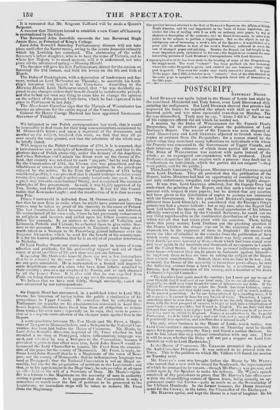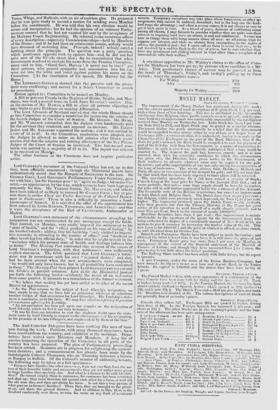POSTSCRIPT.
SATURDAY NIGHT. Lord DURHAM was again baited in the House of Lords last night by the combined Ministerial and.Tory forces, even Lord BROUGHAM slyly assisting the malignants. But Lord DURHAM showed that practice had improved his fence : he repelled the attack with skill as well as un- daunted spirit, and was more successful even than on Monday. The foe was discomfited. Truly may he say, " Alone I did it ;" for not one of his compeers offered the aid which he needed not. A motion by the Duke of WELLINGTON for Sir Francis Head's Despatches, led to another palaver about the publication of Lord Durham's Report. The matter of Sir Francis was soon disposed of. Lord MsznoneNE and Lord CLENELG objected to furnish more than copies or extracts front the Despatches; for a reason stated by the latter—that they contained many reflections on individuals with whom Sir Francis was connected in the Government of Upper Canada, and their relatives ; the existence of -which those parties did not suspect. The Duke of WELLINGTON was content with parts instead of the whole ; so an expurgated correspondence will be produced. [Lord Durham's despatches did not require such .a process : they dealt not in " reflections on individuals. which the parties did not suspect "—they were public, and for the public.] Then, Lords ABERDEEN, WICKLOW, INIELnorn NE, and LENELG opened upon Lord Durham. They all protested that the publication of the Report, befbre Ministers had had an opportunity of considering it, was not only unfortunate, irregular, and unprecedented, but highly danger- ous. It was true, Lord GLENELG admitted, that Sir George Grey had authorized the printing of the Report, and that such a course was not unusual with respect to state papers; but lie denied that tiny sanction had been given to the distribution of copies to persons not connected with the Government. On this point Lord Dtatuases impression was different from Lord Glcnelg's ; he considered that Sir George's Grey's permission had a greater latitude : but at any rate, after the Report had been laid before the Queen, and the Hoy al approbation of his labours officially conveyed to him by the Colonial Secretary, he could not see any thing reprehensible in the confidential distribution of a few copies, which was all that had taken place with his sanction. Then, laying aside this petty matter, Lord Durham put the pit:citing question to the House, whether the danger was not in the existence of the evils exposed, not in the exposure of them in England ? He treated with scorn she idea of mischief in the colonies from the publication of facts which every man, woman, and child there was fully aware of, tianigh ewer Lords:!ips were ibnueaut tS which had been stated over and over again in the hundreds and thousands of newspapers in Canada and the United States. But whatever his pe).sonal indiscretion might have been—whatever they might please to insinuate against himself— he implored them to lose no time in taking the subject of the Report into earnest consideration. Indeed, there was no time to be lost : and, to satisfy the House of the necessity of immediate proceedings, he read the following extract from a letter, written by a gentleman of large fortune, late Representative of his county, and a member of Sir JOHN COilnIrne'S Spevial Council- 44 The Loyalists have again saved the country ; but I need ant say to one of your thos0,11t that it is aliamt at our total runs, for we are all sabers. Cen- se:wen Hy, we shall soon want bread, fur want of labourers in our lilts. If the (;,,vernment intends to retain the North Amcrican Colonies, some- thing must be done, and that right soon, or the country will be worth nothing to the present generation. As tbr our being get cited by a standing army, it is all la list taw; it cannot he done for any length of tnno. Therethre, J. repeat,. something must be soon done; and it appears to me the only thing that mn be done, with the least prospect of success, is to g,4 is back into a constitution of some kind as soon as possible; but it must be Ea.ri/A. We are daily told that this and that ooh!..iltnn is to replace Lord Durham : all tide can he of no me— the thing must he :•ettled in England. Frame a refit talon in the lomperiaf Parliament, let it be what it may ; and scud that, and a man of ability to put it practically into operation, and rebellion dies a natural death."
The only other business in the House of Lorda, worth notice, was
Lord COLCHESTER'S announcement, that on Thursday next he 010)111(1 move for papers respecting the Navy, and found a motion thereon. Ile said he had taken this step without consultation with any one. [Now it will be seen, whether the Duke will not put a stopper on Lord Col- chester, as well as Lord Hardwicke.] In the House of Commons, Mr, VILLIERS presented the petition of the Anti-Coro-law Delegates. It was ordered to be printed with the Votes. This is the petition on which Mr. Villiers will found his motion on Tuesday next.
Mr. Haley iev's case was brought before the House by Mr. WYNN ; who moved that a new writ be issued for Southwark, time representation of which he assumed to ice vacant,—though Mr.11arvey was present, and called upon by the Speaker to make his defence. Mr. Wynn 's speech consisted of dry precedents to prove that Mr. Harvey's late office came within the disqualifying statute of Queen Anne, being actually an ap- poiutment under the Crown—quite as much so as the Stewardship of the Chiltern Hundreds. In the former instance, the Home Secretary acted for the Crown ; in the latter, the Chancellor of the Exchequer. Mr. HARVEY spoke, and kept the House in a roar of laughter. He hit
Tories, Whigs,
and Radicals, with an air of reckless glee. He protested that he was quite ready to second a motion for sending every Member before his constituents. He was told that his own election would be secure and inexpensive ; but he had the opinion of an eminent Parlia- mentary counsel that he had not vacated his seat by the acceptance of the Hackney Coach Registrarship. He referred to the numerous offices of every description—especially Commissionerships—held by Members of the House ; and if he had been an aristocratic cousin, nobody would have dreamed of molesting him. Principle, indeed I nobody cared a farthing about the principle. The question was a party question, which gentlemen opposite took up against him—and he did not feel quite sure of the friends about him; for he remembered that when Government resolved to exclude his name from the Pension Committee, many said to him, "Good God, Harvey it never can be true?" yet those persons, who poured sympathy and consolation into his ear, went out into the lobby and voted against putting his name on the Committee. [At the conclusion of his speech, Mr. Harvey left the House. j
The ArronNEv-thesEnAL showed that the practice and the prece- dents were conflicting ; and moved for a Select Committee to search for precedents. Motion agreed to ; Committee to be named on Monday.
A Bill to prevent Frauds in the. Register of Births, Deaths, and Mar- riages, was read a second time, on Lord Jour: Ili:fist:1,1:s motion. Also, on the motion of Mr. linmEs, a 13111 to allow all persous objecting to take Oaths to give Evidence on making Affirmation.
The Lord Advocate of Scotland moved that the whole House should go into Committee to consider a resolution for increasing the salaries of the Scotch Judges of the Court of Session. Mr. GILLON, Mr. How:, and Mr. WALLACE contended, that the Judges were handsomely paid for the services they rendered, and opposed an increase. Mr. ELLICE junior, and Mr. AGLIONBY supported the motion ; and it was carried by a vote of 56 to 27. In the Committee, resolutions were adopted, that the Judges be allowed to retire on full salaries after fifteen years service, and that the salaries and retiring allowances of the five Puisne Judges of the Court of Session be increased. The last-named reso- lution was carried by a majority of 67 to 20. The report was ordered to be received on Monde.
The other business in the Commons does not require particular notice.



























 Previous page
Previous page